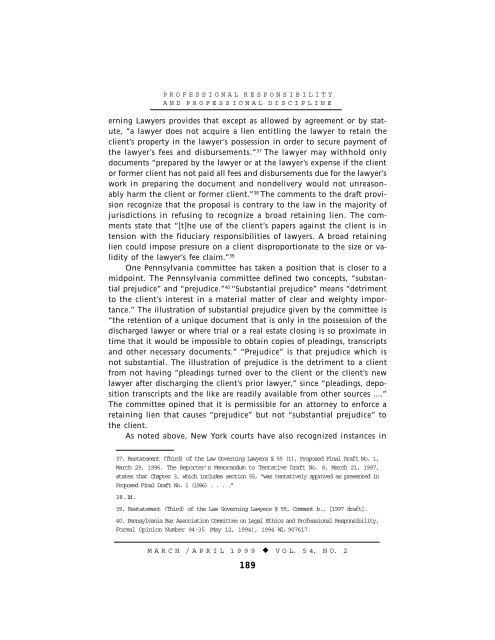THE RECORD - New York City Bar Association
THE RECORD - New York City Bar Association
THE RECORD - New York City Bar Association
You also want an ePaper? Increase the reach of your titles
YUMPU automatically turns print PDFs into web optimized ePapers that Google loves.
P R O F E S S I O N A L R E S P O N S I B I L I T Y<br />
A N D P R O F E S S I O N A L D I S C I P L I N E<br />
erning Lawyers provides that except as allowed by agreement or by statute,<br />
“a lawyer does not acquire a lien entitling the lawyer to retain the<br />
client’s property in the lawyer’s possession in order to secure payment of<br />
the lawyer’s fees and disbursements.” 37 The lawyer may withhold only<br />
documents “prepared by the lawyer or at the lawyer’s expense if the client<br />
or former client has not paid all fees and disbursements due for the lawyer’s<br />
work in preparing the document and nondelivery would not unreasonably<br />
harm the client or former client.” 38 The comments to the draft provision<br />
recognize that the proposal is contrary to the law in the majority of<br />
jurisdictions in refusing to recognize a broad retaining lien. The comments<br />
state that “[t]he use of the client’s papers against the client is in<br />
tension with the fiduciary responsibilities of lawyers. A broad retaining<br />
lien could impose pressure on a client disproportionate to the size or validity<br />
of the lawyer’s fee claim.” 39<br />
One Pennsylvania committee has taken a position that is closer to a<br />
midpoint. The Pennsylvania committee defined two concepts, “substantial<br />
prejudice” and “prejudice.” 40 “Substantial prejudice” means “detriment<br />
to the client’s interest in a material matter of clear and weighty importance.”<br />
The illustration of substantial prejudice given by the committee is<br />
“the retention of a unique document that is only in the possession of the<br />
discharged lawyer or where trial or a real estate closing is so proximate in<br />
time that it would be impossible to obtain copies of pleadings, transcripts<br />
and other necessary documents.” “Prejudice” is that prejudice which is<br />
not substantial. The illustration of prejudice is the detriment to a client<br />
from not having “pleadings turned over to the client or the client’s new<br />
lawyer after discharging the client’s prior lawyer,” since “pleadings, deposition<br />
transcripts and the like are readily available from other sources ....”<br />
The committee opined that it is permissible for an attorney to enforce a<br />
retaining lien that causes “prejudice” but not “substantial prejudice” to<br />
the client.<br />
As noted above, <strong>New</strong> <strong>York</strong> courts have also recognized instances in<br />
37. Restatement (Third) of the Law Governing Lawyers § 55 (1), Proposed Final Draft No. 1,<br />
March 29, 1996. The Reporter’s Memorandum to Tentative Draft No. 8, March 21, 1997,<br />
states that Chapter 3, which includes section 55, “was tentatively approved as presented in<br />
Proposed Final Draft No. 1 (1996) . . . .”<br />
38. Id.<br />
39. Restatement (Third) of the Law Governing Lawyers § 55, Comment b., [1997 draft].<br />
40. Pennsylvania <strong>Bar</strong> <strong>Association</strong> Committee on Legal Ethics and Professional Responsibility,<br />
Formal Opinion Number 94-35 (May 12, 1994), 1994 WL 907617.<br />
M A R C H / A P R I L 1 9 9 9 ◆ V O L. 5 4, N O. 2<br />
189

















